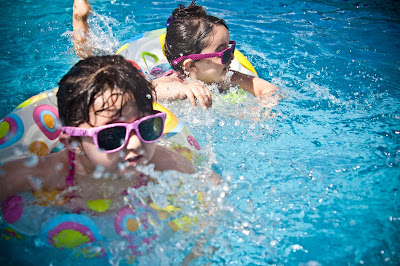Imagine
walking into a class on English Literature and finding that the first several
classes were going to go over basic words like “cat” and “car,” and your first
exam was on short novels like ones you read as a kid. For some people who are
just starting to learn and read English, those classes would be valuable and
necessary to learning more complex words and building reading comprehension. To a native English speaker, it seems like a waste of time and you’d be bored and frustrated
having to spend your time learning about the silent “e” all over again. In this
case, your goals and the goals of everyone else in the class, regardless of
skill, have been mashed together and you need to catch the less-skilled
classmates up before you can learn anything new.
 |
| Lucy may excel at gross motor function, but maybe one of her goals should be listening to directions. |
This
is why individualized goals at social skills groups are important. Some of the
kids might really need to work on basic intraverbal interactions (“What’s your
name?” “Barry, what’s yours?” “Richard.”), but some of your kids may already
have mastered those intraverbals and don’t need to practice asking peers what
their name is or what their favorite color is. Get to know each kid in the
group and understand what each one needs to work on, and what’s appropriate for
them to work on. Knowing what each kid needs to work on means it’s
easier to pair them up with each other for practice; if Barry and Richard both
have goals for initiation, they can both be presented with natural
opportunities to initiate with each other. Or, if Barry is great at reading comprehension games but needs to work on initiation, maybe he could get paired up with Lisa, who's great with initiation but needs help working on reading comprehension. Knowing individual goals makes it easier to help kids help each other in age appropriate ways. If
a kid has an Individualized Education Plan for social and behavioral goals at
school, they should have something similar at group.
 |
| Barry could use a friend who's a good with sportsmanship to help him develop that skill. |
 |
| Just a few of the folders we use to organize individualized goals and data sheets for our social groups. |
There’s a saying in special education: “If you’ve met a
kid with autism, you’ve met one kid with autism.” No two kids are going to be
the same, have the same goals, like the same things, and it’s unfair to treat
them like they all popped out of the same mold. It’s important to remember to
treat kids with autism with the same respect and nurturing as you would treat
any typical kid. Individualized goals keep those kids from fading into the
hectic background of social skills group and keep them improving and growing
into the awesome adults they’re going to become. Individualized goals reduce
frustration during groups and keep minds active and learning, which is the
most important part of any group. It is a disservice to give the kids anything
less than individualized goals and the attention and guidance they need to
reach those goals. Think about the earlier example of the English Lit class;
you wouldn’t want to have to sit through Cat in the Hat again when you know you
could be doing more advanced work. You also wouldn’t want to launch headfirst
into Dickens before you can work out the rhyme schemes in Hop on Pop. Remember
to have the same consideration for the kids in your social group and put
yourself in their awesome light-up shoes.




No comments:
Post a Comment